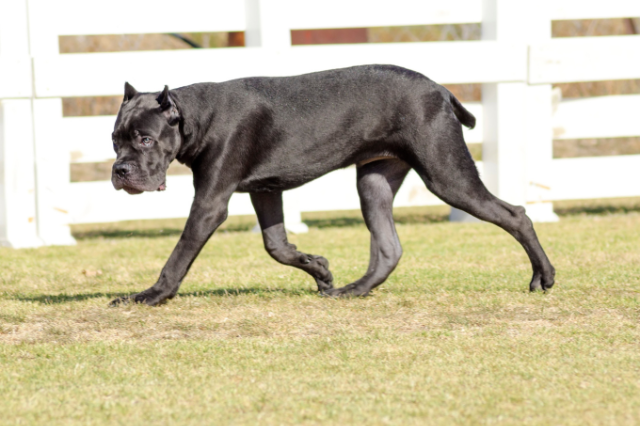Cane Corsos are known for their intelligence, loyalty, and protective instincts. When it comes to caring for a Cane Corso breeder, the responsibility grows even greater. Breeding dogs require optimal physical health, sound temperament, and a well-maintained lifestyle to ensure they can safely and responsibly produce strong, healthy litters. Whether you’re an experienced breeder or just starting out, this guide will walk you through the essential steps of caring for a Cane Corso breeder the right way.
1. Prioritize Physical Health with Regular Vet Care
Routine veterinary check-ups are non-negotiable for breeding dogs. For a Cane Corso breeder, a full health screening every 6–12 months is recommended. This includes:
-
General health exam
-
Hip and elbow evaluations (hip dysplasia is common in large breeds)
-
Eye examinations
-
Heart evaluations
-
Reproductive health checks
Ensuring your breeder is free of hereditary health conditions is essential. Around 24% of Cane Corsos are prone to joint issues, so early detection and prevention are key.
2. Feed a High-Quality, Breeder-Appropriate Diet
Nutrition plays a foundational role in your breeder’s ability to stay fertile, energetic, and healthy. Feed a high-protein, high-fat diet specifically designed for large breeds or breeding dogs. Consider these guidelines:
-
Protein content: 26–30%
-
Fat content: 15–20%
-
Daily caloric intake: Approximately 2,200–2,500 calories depending on size and activity
If your Cane Corso is pregnant or nursing, consult your vet to adjust portions and nutrients to meet those needs.
3. Maintain Optimal Body Condition and Weight
A healthy breeder should not be overweight or underweight. A body condition score (BCS) of 4–5 out of 9 is ideal. Excess weight can cause fertility problems and exacerbate joint stress.
Use regular weight checks, visual assessments, and touch to gauge condition. If ribs are not easily felt or there’s excessive fat over the back or tail base, it’s time to adjust the diet and exercise regimen.
4. Provide Daily Exercise and Mental Stimulation
Cane Corsos are a working breed, and breeders must stay fit. Without enough activity, they can become bored or develop behavioral issues. Aim for:
-
60–90 minutes of physical activity daily
-
Activities like walking, fetch, tracking exercises, and agility work
-
Mental tasks like obedience training, scent games, or food puzzles
Structured activity not only improves physical health but supports hormone balance and mental sharpness.
5. Create a Comfortable, Clean Living Environment
Your breeder should have a calm, clean, and stress-free space, especially during heat cycles, mating, and whelping periods. Best practices include:
-
A climate-controlled indoor area (65–75°F is ideal)
-
Regular sanitation of bedding and feeding areas
-
Separate housing from other dogs when necessary to reduce stress or prevent unplanned mating
A clean environment also reduces the risk of parasites and bacterial infections, which are critical concerns for pregnant dogs.
6. Grooming and Hygiene Shouldn’t Be Overlooked
Though Cane Corsos have short coats, they still require regular grooming:
-
Brush once a week to remove loose hair and maintain skin health
-
Bathe every 6–8 weeks, or as needed
-
Clean ears weekly and check for signs of infection
-
Trim nails monthly to avoid splaying or joint strain
Regular grooming also helps you detect any physical changes, such as lumps or rashes, early.
7. Monitor Reproductive Health Closely
Reproductive care is essential for breeder well-being. Here are some key practices:
-
Track heat cycles using a calendar or app (they occur roughly every 6–8 months)
-
Avoid breeding on the first heat; wait until at least 18–24 months of age
-
Allow at least one heat cycle of rest between pregnancies
-
Use progesterone testing to determine optimal breeding times
-
Perform pre-breeding and post-breeding health checks
Poorly timed or excessive breeding can lead to serious health complications like uterine infections (pyometra) or hormonal imbalances.
8. Practice Ethical and Responsible Breeding
Being a breeder comes with ethical obligations. Only breed Cane Corsos with sound temperament, strong physical traits, and thorough health screening. Track lineage to prevent inbreeding and maintain genetic diversity. You’re not just caring for a dog—you’re influencing the future health of an entire bloodline.
9. Prepare for Pregnancy and Whelping
When your breeder becomes pregnant, support her with:
-
A quiet, private whelping area
-
Nutritional adjustments starting around week 5 of pregnancy
-
Regular vet visits and ultrasounds to monitor fetal development
-
Assistance during labor, which typically lasts 6–12 hours
Post-whelping, provide extra calories (up to double her usual intake), keep the area warm and clean, and monitor for signs of infection or distress.
Conclusion
Caring for a Cane Corso breeder is not just about physical maintenance—it’s a long-term commitment to health, structure, and responsibility. With proper nutrition, consistent vet care, ample exercise, and a nurturing environment, your breeder can thrive and contribute positively to the Cane Corso lineage.
If you’re considering expanding your breeding program or looking for strong bloodlines, explore Cane Corso puppies for sale in Oklahoma with Corinthian Corsos—where champion genetics meet exceptional care.


